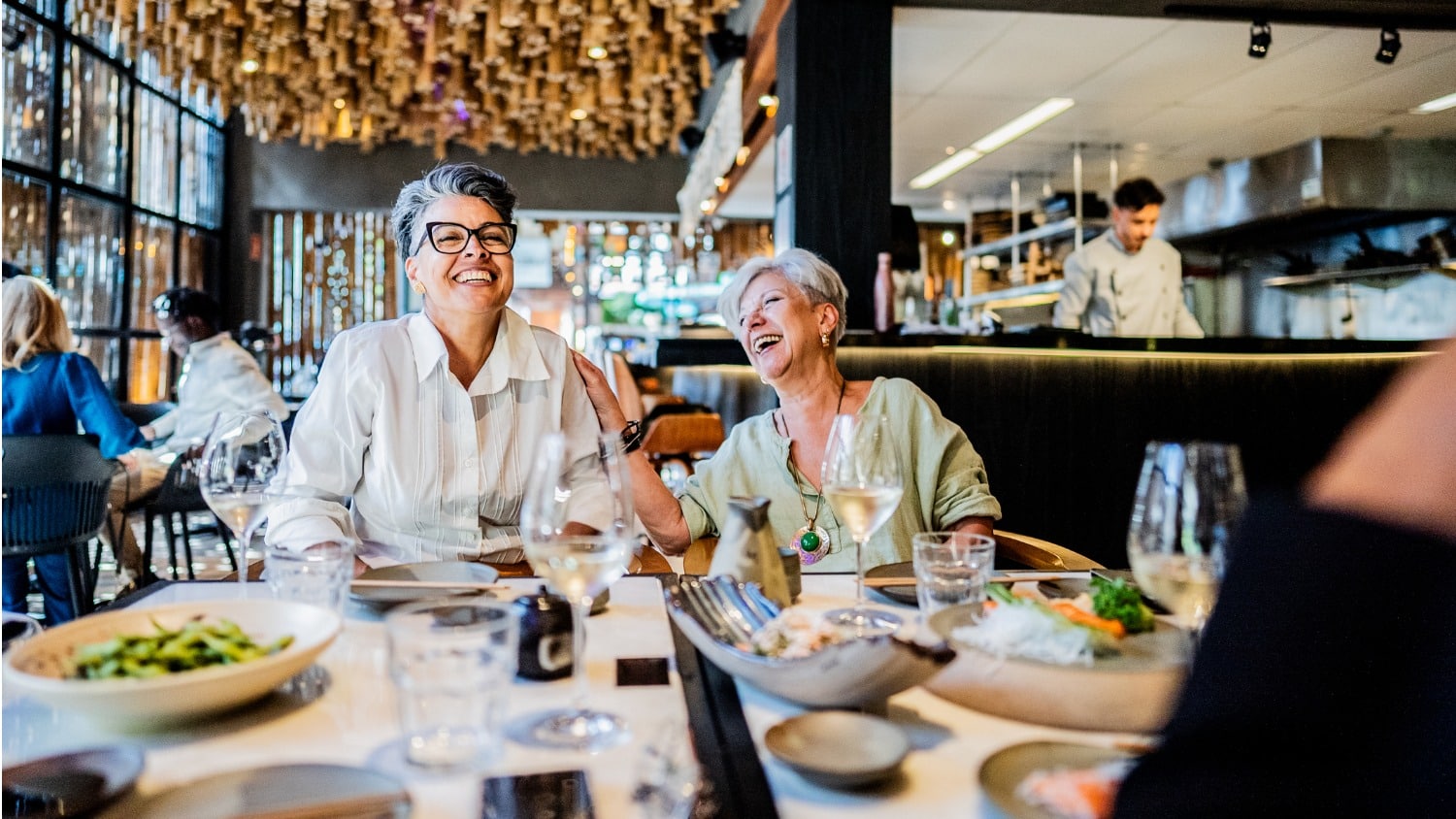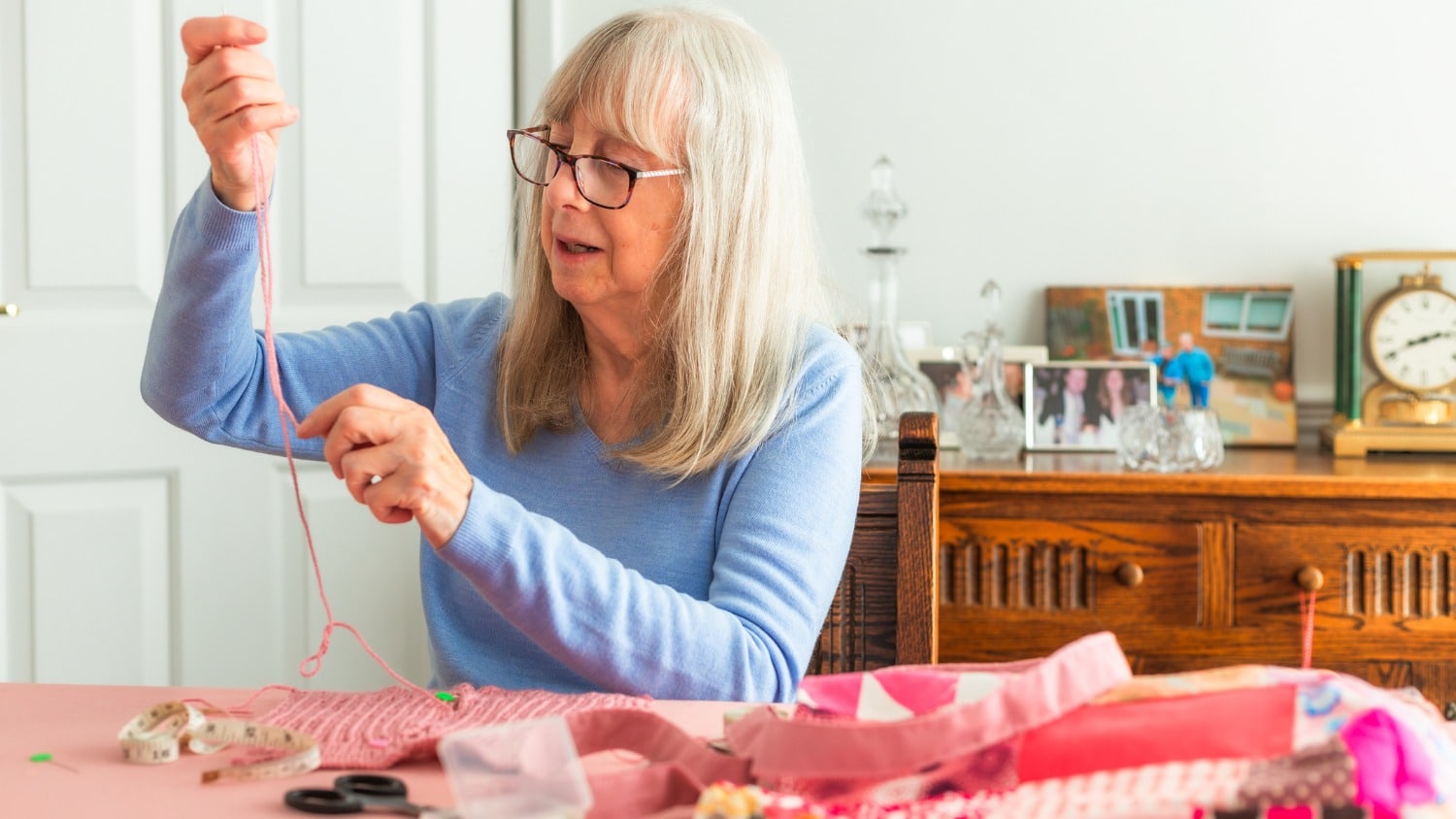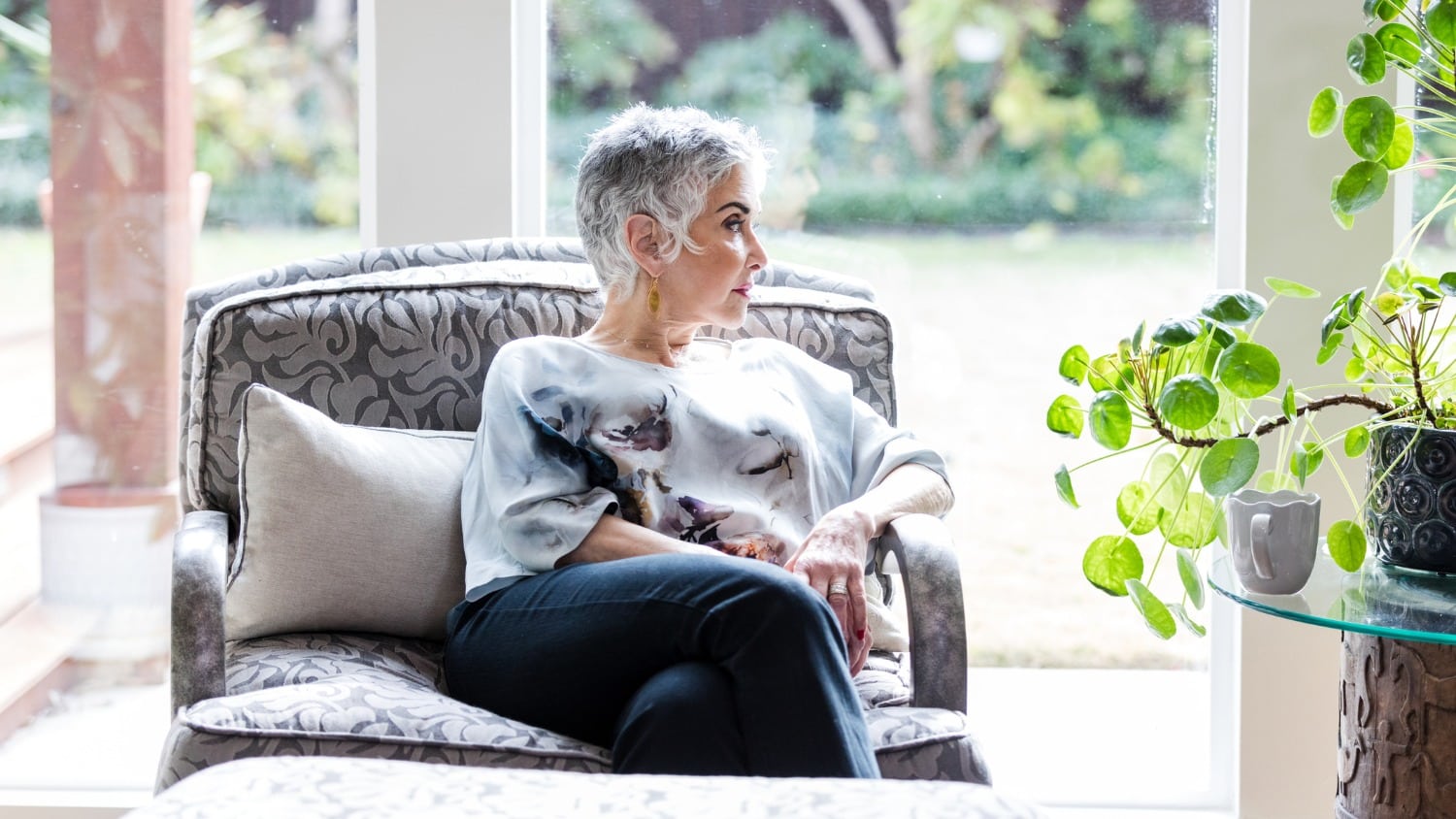[ad_1]
Do you ever leave a restaurant, unbutton your pants in the car, and think, “Ugh! How did that happen?” You didn’t even want the chips. To be honest, they were a bit stale.
You had a whole plan. You were going to “be good,” get the grilled chicken salad (no croutons, dressing on the side), feel proud of yourself, and go home with your integrity intact.
But there you were, laughing too loud, nodding along, reaching for chip after chip, like your hand had a mind of its own. The basket was gone before you even realized it. Again.
It’s Not About the Chips
And then came that sinking feeling. The one that whispers, “Why do I keep doing this?”
Let me tell you something: it’s not about the chips.
It’s about who you were with.
It’s about what the chips represent: comfort, connection, not being the weird one who orders vegetables while everyone else orders nachos.
If you’re a woman in midlife trying to feel better in your body, less bloated, more clear-headed, fewer nights of regret-eating, it’s not the food that’s the hardest part. It’s what happens around the food.
You’re not just changing what’s on your plate. You’re changing the rhythm of your friendships. The “thing you do” with your people. The rituals that have tethered you to your social circle for years.
And suddenly, dinner isn’t dinner. It’s a negotiation between the woman you’re trying to become… and the one everyone expects you to still be.
Stick with me. We’re going to unravel this together.
Why Eating “Better” Feels So Lonely
Let’s talk about something no one tells you when you decide to eat healthier:
It’s not the cravings.
It’s not the sugar withdrawals.
It’s the weird disconnection that we experience.
Because when you change how you eat, you’re not just skipping dessert. You’re messing with the social contract. The unspoken agreement in your friend group, your family, your relationship that says, This is what we do together. We eat queso on Fridays. We split dessert on birthdays. We get wine because “it’s been a week.”
And when you order the grilled fish while everyone else orders fried chicken, you’re not just making a different choice. You’re quietly renegotiating the rules, and everyone feels it.
Let me tell you about my client Diane.
Diane was crushing it. She’d been working with me for a few months, feeling more in tune with her body, her stress, her cravings. She had a plan for the work dinner. Checked the menu in advance. Knew what she wanted.
But when she sat down and everyone else ordered fried chicken, she hesitated.
Not because she wanted it. She doesn’t even like fried chicken. But because not ordering it felt like saying, “I don’t belong here anymore.”
So she ordered it. Ate it. Felt awful.
And then spent the next day spiraling.
That’s the part diets never prepare you for: when food is friendship, and saying no to the appetizer platter feels like saying no to your people.
This isn’t about calories. It’s about connection, identity, and the fear of being othered, even quietly.
And that’s lonely as hell.
The Hidden Cost of Social Eating
You wake up the next morning bloated, tired, and a little mad at yourself. You promised you’d listen to your body. You swore you weren’t going to “do that thing” again, where you eat something just to avoid the awkwardness. Just to fit in.
And now you’re stuck in the spiral of Why did I do that? and What’s wrong with me?
Here’s the truth: Food isn’t just food. It’s a love language. It’s how we celebrate, soothe, and say I’m with you.
Especially for women in midlife, food becomes a way we care for others, and prove we still belong.
We bake the cookies, bring the wine, split the dessert, say yes when we want to say no. Not because we’re hungry, but because we’ve been trained to prioritize harmony over hunger cues.
We don’t want to be the difficult one. The picky eater. The buzzkill.
So, we smile and chew, even as our body says please stop, and then we beat ourselves up later. The guilt and shame isn’t a willpower problem.
It’s a sign you’ve spent decades learning to eat in a way that keeps other people comfortable, even when it costs you.
And the worst part is that you don’t even realize you’re doing it until your jeans won’t button and your self-trust is shot.
You’re Not Failing, You’re Changing
That uncomfortable, out-of-place feeling you get when you say no to the chips, isn’t a red flag. It’s a sign that you’re evolving.
You’re not broken.
You’re not “bad at this.”
You’re not weak or undisciplined.
You’re in the middle of an identity shift, and that kind of growth is always a little messy.
I remember when I started rethinking my relationship with alcohol.
I wasn’t doing a Whole30. I wasn’t in recovery. I just realized I didn’t like how I felt after a glass of wine. The sleep sucked. I got cranky. I’d lose my momentum for days.
So I started saying no. Quietly, without drama.
And some people I’m friends with lost their minds: “Is something wrong with you?” “What – you don’t like us anymore?” “Are you okay?”
Suddenly, I wasn’t matching the mood. I wasn’t the same “fun” version of me. And that shift, however small, felt weird for everyone, including me.
The same thing happens with food. When you stop eating the way your people expect you to, the whole vibe changes.
But that discomfort isn’t a reason to go back. It’s proof you’re growing into someone new. And yes, that might rattle a few dynamics. But it’ll also rebuild your self-worth from the inside out.
Why Diets Don’t Prepare You for People
You know what no one talks about? Diets don’t fail because you didn’t count the carbs right. They fail because they never prepared you for people and social situations.
Sure, they give you a color-coded chart, a grocery list, maybe even a container system.
But what do they say about the moment your grandkid looks up at you with cookie crumbs on their face and says, “Grandma, aren’t you having one too?”
What do they tell you to do when your partner huffs, “So we’re doing this again?” after you swap rice for cauliflower rice?
Or when your coworkers plan a birthday lunch at the all-you-can-eat fried taco place, and your options are “be the buzzkill” or “eat stuff that makes you feel like garbage”?
Diets never prepare you for those moments.
They treat your life like a lab. Sterile. Isolated. Free from emotional history, traditions, and people-pleasing tendencies you’ve been carrying since middle school.
But real life? Real life is a system.
A rhythm of habits, roles, and routines you’ve been dancing to for years.
And when you make healthy changes after 50, especially around food, you shake that whole system up. People get twitchy. They don’t know how to relate to you when you’re not doing what you used to do.
So they joke. They pout. They get defensive. And suddenly, what started as a personal decision turns into a full-blown social standoff.
This isn’t diet sabotage. This is system disruption. And it’s exhausting to be the one always swimming upstream while everyone else is doing cannonballs in queso.
If you’ve ever thought, “Why can’t I just eat like everyone else?”
This is why.
And no meal plan in the world is going to solve that.
What Actually Works: Two Skills You Need
So, if food rules and macros aren’t the answer… what is?
When I work with women in my midlife health coaching practice, we don’t obsess over the perfect meal prep container or whether fruit has “too much sugar.”
We focus on two underrated, life-changing skills: awareness and flexibility.
Awareness
Awareness is about getting quiet enough to hear your body whisper, before it starts screaming.
It’s asking questions like:
“Am I actually hungry?”
“Is this food satisfying or just here?”
“Do I want this or just feel like I should?”
Because when you’re out with friends, it’s easy to eat like you used to, even when your body’s screaming, Please don’t! Awareness helps you catch it before you’re unbuttoning your jeans in the car again.
Flexibility
And then there’s Flexibility.
Flexibility means learning how to eat differently without making it weird. You don’t have to launch into a TED Talk about your gut health. You don’t need to defend brussles sprouts. You can just say, “I’m good with this tonight,” and move on.
Sometimes that means eating the thing; sometimes it means skipping it. Either way, you’re allowed to change your mind without guilt.
This is where Habit #7 from my 8 Basic Habits that Healthy People Do Guide & Checklist comes in:
Eat Just Enough, Not Too Much
Even if the table orders loaded nachos, you still get to check in. You still get to stop when you’re satisfied.
You still get to protect your peace, without making a big deal.
Because true health isn’t about restriction.
It’s about relationships.
With your people. And with your body.
And once you stop treating food like it’s all or nothing, you realize: You don’t need to pick between eating what you want and being who you want to be.
You Don’t Have to Choose Between Health and Connection
Here’s the part no one told you, and maybe the most important thing I’ll say:
You don’t have to pick between feeling good in your body and feeling close to your people.
You don’t have to fake-laugh through a second margarita you didn’t want. You don’t have to eat the birthday cake just because everyone’s watching. And you definitely don’t have to isolate yourself just to eat a salad in peace.
Connection doesn’t come from matching orders. It comes from presence. From being real. From showing up as you.
The truth is, you can absolutely have healthy eating without isolation. You can be the woman who trusts herself with food and still belongs at the table.
How?
With awareness and flexibility, not more rules. Not more willpower. Not another diet promising you control if you just try harder.
You already know what to eat.
Now it’s about learning how to stay connected to yourself while staying connected to the people you love.
Because food can still be part of the ritual…
It just doesn’t have to be the whole relationship.
And when you get that?
You stop needing the stale chips to prove you belong.
Let’s Make This Easier
If you’ve been blaming yourself for not having enough willpower, let me offer you something softer:
- You’re not failing.
- You’re navigating emotional eating and relationships in a world that never taught you how.
- You’re trying to honor your body without blowing up your social life.
- You’re trying to stop eating to please others without also feeling like a selfish jerk.
That’s brave. And hard. And way more complicated than any diet plan ever admitted.
If this post hit home, I’ve got something that can help.
It’s called 82 Reasons You Overeat That Have Nothing to Do with Food. It’s free. It’s honest. And it’ll help you start seeing what’s really driving your habits. Because this isn’t just about what’s on your plate.
It’s about what’s happening around it, your stress, your schedule, your relationships, your beliefs. You deserve to feel good in your body without sacrificing your sense of belonging.
Let’s make that easier.
Please Join the Conversation:
Do you overeat in social settings? What has been your experience with diets under social pressure?
[ad_2]
Source link





